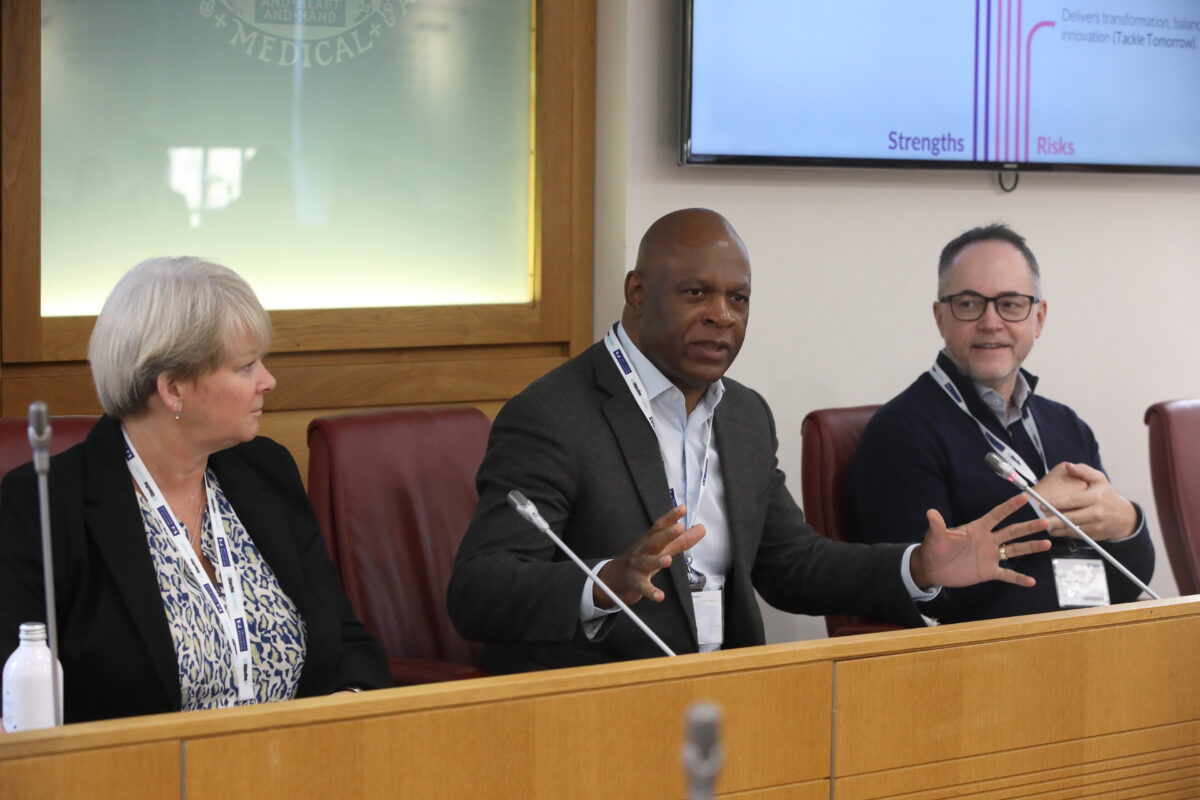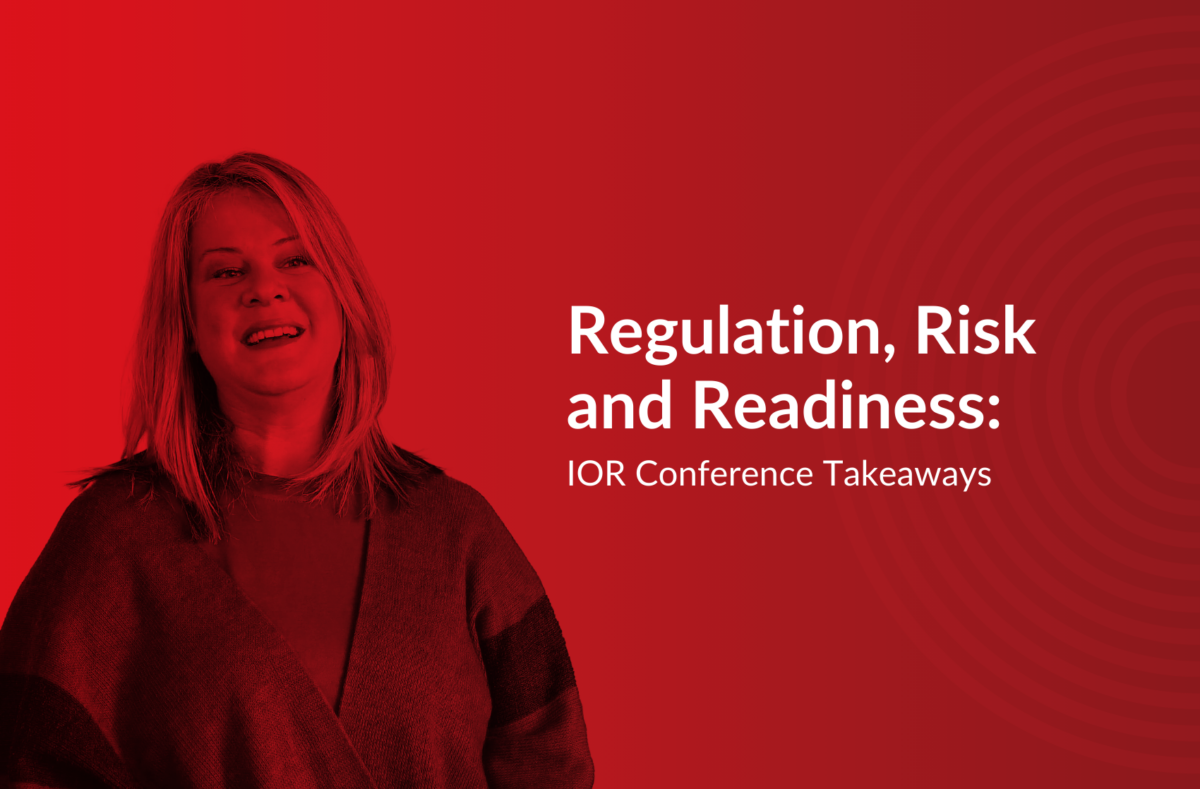Attending the Institute of Regulation’s Annual Conference at the British Medical Association House in London was a genuinely energising experience. The day brought together regulatory leaders and thinkers to engage in rich discussion, challenge assumptions, and explore how regulation can evolve to meet a fast-changing world.

Pictured: Joe Montgomery, Katrina Paget, and Warren Buckley.
Under the thoughtful stewardship of Michael Hanton, Deputy Regulator of Ofqual and Chair of the event, we were invited to pause and reflect—not just on regulation as a tool for public protection, but also as an enabler of innovation and a pillar of democracy. With over 50 regulators now in the IOR network, the collective ambition to share learning, build trust, and lean in together was palpable throughout the day.
Navigating Complexity with Care and Courage
The regulatory landscape is becoming increasingly complex. Political pressures, legislative reform, financial constraints, and public expectation are all placing new demands on those in regulatory leadership roles. The conference made it clear that navigating these pressures requires more than just systems and process—it takes courage, adaptability, and a willingness to think differently.
Many of the conversations I had, both in and outside the formal sessions, came back to a shared recognition: leadership matters. And the kind of leadership required today is evolving.
Technology, Data and the Shift from Enabler to Essential
One of the most prominent themes of the day was the growing strategic importance of digital, data, and technology across the regulatory space. During the leadership-focused session hosted by GatenbySanderson, it was encouraging to see that over 80% of survey respondents are already taking steps to improve digital skills and literacy within their organisations.
There was a clear call to move beyond viewing digital transformation as a technical issue—it’s increasingly a leadership priority. Whether through appointing a Chief Digital and Information Officer at Board level, or bringing in Non-Executives with experience in data or emerging technologies, organisations are beginning to make capability in this space a strategic differentiator.
Importantly, the discussions emphasised that digitisation shouldn’t be an end in itself. One comment stuck with me: the role of technology is to make doing the right thing easier, more transparent, and more efficient—for regulators, and for those they regulate.
Spotlight on Innovation and Collaboration
It was also inspiring to hear about practical examples of innovation. The ICO’s award-winning Privacy Notice Generator, designed through engagement with end users, not only improved accessibility but delivered significant cost savings and increased impact. Similarly, the collaboration award for the National Health Research Authority highlighted the power of partnership—not just across regulators, but with the sectors they serve.
These case studies are a helpful reminder that innovation doesn’t always need to be high-tech. Sometimes it’s about mindset, collaboration, and finding better ways to connect policy with lived experience.
Balancing Risk with Progress
The conversations around risk were particularly insightful. While frameworks and oversight remain essential, many speakers talked about the need to shift how we think about risk—especially in light of the Government’s 25% cost reduction target for regulation by the end of this Parliament.
There’s an increasing need to consider risk not just through a technical lens, but also through a human one. Several attendees reflected on how cautious mindsets, especially at Board level, can sometimes hold back progress. A more nuanced approach—balancing rigour with responsiveness—will be key.
Ultimately, effective regulation relies on trust. That means listening to stakeholders, using data well, and creating environments where innovation is possible. And again, the thread running through all of this is people.
Investing in the Right Talent
One of my biggest takeaways from the day is that the future of regulation will be shaped by those willing to invest in the right leadership. Whether that’s a digitally literate NED, a CDIO with board-level influence, or a team of senior leaders who can work across systems with empathy and agility, capability in this space matters more than ever.
At GatenbySanderson, we’re proud to support the sector in finding and developing that talent. We’re already working with regulators across the UK to build leadership teams that can respond to the moment—whether that’s in digital, data, transformation, or governance.
If you’re reflecting on how to strengthen your executive or board with these capabilities, I’d love to have a conversation. Sometimes the first step is simply carving out the space to think it through.
This year’s conference reaffirmed that regulation is not only about keeping up with change—it has the potential to shape it. Through thoughtful leadership, collaborative approaches, and a willingness to embrace digital capabilities, the regulatory community can continue to protect the public interest while enabling innovation and economic growth.
Thank you to the Institute of Regulation for creating such a valuable space for shared learning and connection. I came away energised, and optimistic about what’s possible.
Author:

Sarah Luxford,
Partner
Digital, Data & Technology
Find out more about GatenbySanderson’s Digital, Data & Technology practice and Regulation practice.
